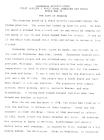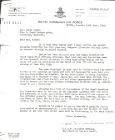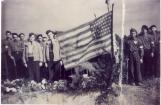1
On June 6, 1944 the Allied forces invaded the coast of Normandy, France by air, sea, and land. Sandy Hinds along with the rest of his aircrew took part in the missions. On June 7, their plane was hit by gunfire and burst into flames. The pilot gave the order to bail out. The crew moved quickly and Sandy saw that they were ready to jump. At this moment Sandy bailed out by parachute. He landed in a thicket and looked for his crew. There was no sign of anyone. He was the only survivor. The rest of his crew had perished in the plane.The Gift of Freedom, by Joyce Hinds
Alexander McCuaig Hinds,
Pilot Officer J 90632 Royal Canadian Air Force
World War II
2
Jim Thom and Sandy Hinds worked at the Dominion Malting Plant Limited1960
South Transcona, Transcona, Manitoba, Canada
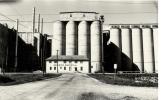
3
The piercing sound of a train whistle resounded across the frozen prairies. The young boy looked up from his play. He knew the whistle sounded five o'clock and the men would be teaming out the gates of the railway shops headed home for dinner. It was as if the whole town raised their forks and knives in unison at five o'clock.Alexander McCuaig Hinds, known as Sandy, was brought up in the town of Transcona, Manitoba, Canada. Transcona boasted about nine thousand people and was situated near the capital of the province, Winnipeg. Here the winters are bitter cold where the temperature can drop to forty degrees below zero but the summers are warm and balmy. It was a town hit hard by the depression and poor was a way of life. The people were a hardy bunch and their main object in life was survival. The pleasures were simple, picnics, berry picking, sports, moccasin dances, and warm friendships. A strong bond formed between families when they helped one another to survive.
4
Postcard sent from Sgt. Alexander 'Sandy' Hinds to Transcona War Efforts Committee23 February 1944
Europe

5
When the war was declared in 1939, the young men lined up to join the service, in defense of their country. Sandy was the youngest of eight children - three of them perished in infancy. In 1942, Sandy joined the Royal Canadian Air Force. He received his training at bases in Manitoba, Saskatchewan, and Ontario before being sent overseas. In England he first trained on a big engine bomber, the Wellington. Later at Wombleton, he converted to Halifax bombers. From here he went to Tempsforth near Sandy where he joined the 78th R.A.F. Squadron. At this station the planes had no mid-section turrets. As Sandy was trained as a gunner there was no place for him to be positioned. He found out though that this squadron was not dropping bombs, but spies and supplies to the underground. At this point, Sandy was sent to a British parachute centre in Ringway, Manchester for a ten-day training course. Here he made training jumps and one final parachute jump from a plane. This experience proved invaluable to him.Soon they began their missions to France, Belgium, and Denmark. They had made eleven successful missions before the night of June 6, 1944. They didn't learn until after they were airborne that D-Day had begun. That night they dropped dummy paratroopers. On June 7th they were airborne again, this time on a mission over France. Sandy was sitting next to the pilot Frank Lynn. There were laughing, talking and singing silly songs. As they neared their contact spot, Sandy leisurely got up and walked to his place at the centre of the plane, calling and laughing to the others. He lay down in a prone position in readiness for the time he would drop his supplies. At that moment, bullets whistled mere inches above his body. He turned his head and to his horror both ends of the plane burst into flames. Frank, the pilot, gave the order to bail out. Luckily, Sandy was blessed with very quick reflexes and an agile body. He turned and saw Frank, Roy Smith, Bill Westergaard, Bill Bishop, Bill Moffat, and Scotty Hamilton moving and ready to jump. At this moment, he bailed out. He recalls feeling a peace wash over him as he saw each member of his family pass before his eyes. It was night and he had no idea where he would land when he pulled the ripcord. He landed in a thicket of trees with no injuries, with the exception of a black eye. He looked around for any sign of his crew but there was no sound our signed of anyone. They had all perished in the plane.
He quickly hid his parachute and began walking at a fast pace in the opposite direction of the crash. He could hear vehicles going toward the crash site and stopped to listen from time to time to hear whether he was being followed. He had to be alert and depend on his own intuition for this young man, from a small town in the prairies, was in occupied France and he was all-alone!
6
Letter to Mrs. Isaac Hinds informing that Alexander (Sandy) was safe in England3 October 1944
Transcona, Manitoba, Canada
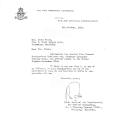
7
When the sun came up the next morning, he hid in a thicket of trees and bush near a field. He watched a little girl tending a cow. She was singing French songs and dancing unaware of the fact that a young man was hiding close enough to reach out and touch her. When darkness fell, he spent the night walking again. Sometime(s) a car would go by and he'd hit the ditch but he went undetected. He hid again the next day but as dusk approached, he began to feel the strain of hunger, thirst, and fear and he began to hallucinate. He saw German soldiers coming toward him but as they neared him, the picture would fade leaving a chilling affected on him.With the coming of the darkness, the walking resumed. Toward the morning, he was desperate for a drink of water. A farmhouse came into view and behold, a pump right there in the yard. He lifted the handle of the pump and there was a loud creak. Lights in the farmhouse went on and a dog barked. Sandy took off running and threw himself in a field where he was hidden by long weeds. Here he fell into a troubled sleep and awoke at daybreak to find himself soaking wet. It had poured rain while he slept. He now was not only hungry, thirsty, and scare, but soaking wet. He knew he had to make a decision. He looked over a saw a man and woman working in a field just a few hundred yards away. He decided to take a chance and walk over and talk to him. When they say him they became very excited and frightened. They pointed to a farmhouse down the road. By this time, desperation had set in and he started down the road in broad daylight. A bus passed by, the people all turned to stare but the bus kept going.
When he got to the farmhouse, the door was open and he just walked in and spoke to the woman, who was ironing. He frightened her half to death. She motioned for him to stay and ran out the door. Was she going for help or for the Germans? He didn't know the answer and again made the decision to have faith. In a short time she came back with a boy who could speak some English but could read and write English as well. They told him to take off his uniform and they burned it. They gave him clothes and fed him cheese, bread, and wine. The young man then took him to a deserted farmhouse and told him to stay there until someone contacted him. He never saw these people again but they had risked their lives for him.
While waiting at the farmhouse, a well dressed lady came by walking her dog. She spotted Sandy before he could hide. She asked if he was getting help and if no one came for him in a few days she would take him up to Paris. However, the next day another man appeared with more wine, bread, and cheese and made the promise that someone would come for him in a few days. There were two more days of waiting and wondering - where was he? How close were the Germans? He no longer had the protection of a military uniform should he be caught. All these thoughts coursed through is head. Finally, two men arrived and they had three bicycles. They told Sandy to follow the but to stay a good distance behind. They rode this way for several miles, through towns and villages and then turned into a wooded area. Here he met a group of men whom he learned were in the Mache, a part of the French Underground. They were having a meeting when the three cyclist(s) rode up. Their leader, St. Paul, a British spy, was talking to them in French when he looked up and said in English, "Who the hell are you?" To say he was a Canadian Airman held no weight at all. They interrogated him for sometime and then took him further into the woods where he met a radio operator from Philadelphia, who was with the O.S.S. He interrogated him again for a long time and then finally came to the conclusion that he could be trusted. Sandy thought the fact that, although he was a Canadian, he was well versed in American baseball helped a little.
9
St. Paul then gave him a good supply of French money but cautioned him to give it out in very small amounts as the future was very uncertain for him.Young man Sandy called Bill offered to share his red, wool blanket with Sandy at night and they became good friends. After the war he found out the man's name was Jaque Bordu. They spent their leisure time practicing French and English. One other young fellow knew no English for conversation but could sing all the American and English hit songs in English.
Many times the Germans heard news of the whereabouts of the Mach and they would chase them into the woods. These chases could go on for several days and if they got too close, Sandy had to take off on his own as no one wanted to be caught in his company?a Canadian Airman.
Sandy learned how to place lights in the fields so the supplies could be dropped in a designated spot. Sometimes, the supplies would be safely dropped and they would get them to the edge of the field when the Germans would come and all the supplies would be lost. They would take to the woods again until they felt safe enough to resume their work.
For a short time, Sandy was taken to a Madam and Mr. Correaux. What a luxury to get a good rabbit stew and to sleep in a feather bed. However, the Germans were close too close again and it was off to the woods to hide once more. The Underground always kept track of his whereabouts and when it was safe, he would be back working with them again.
Toward the end of August, the Allies were advancing. It was rumored that the Americans were getting close to this area. The Underground was becoming more organized and so it was decided that Sandy should be taken to the farmhouse of the Berthelot's. They treated him very well and again they enjoyed he again enjoyed rabbit cooked in a great variety of recipes. Also, eggs were very plentiful. Sandy was becoming impatient as the days dragged on, but he was assured that the liberation was not far too off. He used the money St. Paul had given him to repay all these people for their kindness and bravery.
One day, as Sandy sat passing the time drawing, he heard someone shout "Bosch". He ran out and jumped over a high fence and was headed for the woods when he heard loud laughter and he stopped dead in his tracks. Friends from the Underground had come to check on him and bring him cigarettes, but the difference was they were dressed in uniforms.
10
Sandy Hinds and a British Airman who had been hiding with the French Underground23 September 1944
France
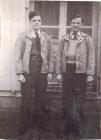
12
On September 23, 1944, the Americans arrived and the area was liberated. Everyone poured into the little town of St. Viatre'. People were waving handmade flags, the Marsielles was playing and people were standing in throngs singing, with tears streaming down their faces. What an unbelievable feeling to feel freedom again.Sandy was taken up to Orleans, to an American camp. Here he was interrogated again, but when he mentioned St. Paul they said "Oh, he's here?" St. Paul had gone through the war unscathed, but wound up with two broken ribs after a short ride in an American jeep. He gave the word that Sandy had been with the Underground and was a Canadian Airman. The Americans treated him royally for two days. He was then flown to a British camp in Bayeux and then sent back to England.
13
An account of the early years of Sandy Hinds and his homelife in Transcona2001
Transcona, Manitoba, Canada
